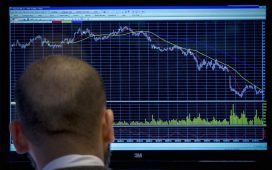Key events
Channel 4 plans deepest job cuts in over 15 years after TV ad slump

Mark Sweney
In the media industry, Channel 4 is drawing up plans to cut potentially as many as 200 jobs in its biggest round of layoffs in more than 15 years.
The cuts, reported by my colleague Mark Sweney this morning, come as Channel 4 seeks to make savings to weather the worst TV advertising downturn since 2008.
The broadcaster, which has undergone a rapid expansion in recent years with staff numbers swelling to a record level of more than 1,200, aims to dramatically reduce a wage bill that now stands at more than £108m a year.
It said the restructure, which management began working on late last year, was intended to focus on accelerating its digital streaming strategy while limiting the extent to which it must make deep cuts to its £700m-plus content budget.
The London stock market has opened in the red, with the FTSE 100 index down 20 points in early trading.
Shell is leading the fallers, down 2.3%, after it reported impairment charges of up to $4.5bn this morning.
BP are also in the fallers, down 1.1%, following the drop in the oil price.
Shell flags Q4 writedown of up to $4.5bn
Elsewhere in the energy sector, Shell is taking impairment charges of up to $4.5bn on its assets.
Shell reported this morning that it will cut the value of its assets by between $2.5bn and $4.5bn in the last quarter.
These impairments are partly related to Shell’s Singapore refining and chemicals hub, which it is looking to sell, but are also due to “macro & external developments”, Shell adds.
But Shell also predicted that earnings at its integrated gas division are likely to be significantly higher in the last quarter of 2023 than in the third quarter.
The announcement comes ahead of Shell’s fourth-quarter earnings, due on 1 February.
Victoria Scholar, head of investment at interactive investor, says,
“Shell reported a mixed trading statement – it is expecting quarterly integrated gas trading to be significantly higher than the third quarter thanks to seasonal factors and increased optimisation opportunities.
However, it said profits from oil and chemicals would be lower resulting in a loss in that division. It is also facing an impairment charge of $2.5bn-$4.5bn in the fourth quarter, relating to its Singapore refining and chemicals hub.
Shell has been facing some price target cuts from the analyst community so far this year including from Morgan Stanley and Bernstein ahead of today’s update. Over the last six months, shares in Shell are up by around 10% thanks to higher underlying oil prices since last summer and better-than-expected third quarter earnings. But strong supply in the United States and a sluggish demand outlook could keep a lid of oil price gains this year. However offsetting this are Opec+ supply cuts and possible interest rate cuts this year and the potential for China’s economy to improve.
Wariness has returned to the financial markets at the start of the week, reports Susannah Streeter, head of money and markets at Hargreaves Lansdown.
Investors are assessing the risks of geopolitical conflict, she says, amid fresh signs of global economic slowdown and uncertainty about the trajectory of inflation.
And on oil, she says:
Oil prices have been fluctuating, as fresh concerns about the Middle East have been brewing, amid worries about supply issues in the region, particularly given the attacks on tankers in the Red Sea.
For now, focus has switched to signs of a dwindling appetite for oil globally, which have pushed down a barrel of Brent Crude to below $78. Saudi Arabia has flagged that it is seeing softening demand, prompting it to cut crude prices for buyers in all regions in February.
Introduction: Oil dips as Saudi Arabia cuts Feb Arab Light crude price
Good morning, and welcome to our rolling coverage of business, the financial markets and the world economy.
Oil is weakening this morning after Saudi Arabia cut the prices charged to its customers.
The Middle Eastern energy powerhouse’s producer, Saudi Aramco, lowered its flagship Arab Light price to Asia by $2 per barrel, to $1.50 a barrel above the benchmark.
That’s a larger reduction than many in the industry expected, and is the biggest price cut in 13 months.
It lowers the February official selling price (OSP) of Saudi Arabia’s Arab Light crude to Asia to the lowest level in 27 months.
Aramco also cut all prices for February delivery to Northwest Europe, Mediterranean and North America.
The move indicates that concerns a slowing economy will hurt demand for oil are trumping fears that geopolitical tensions in the Red Sea will cause supply disruption.
The news has knocked Brent crude, the oil benchmark, down by 1.2% at the start of the week to $77.80 per barrel.
Oil dropped after Saudi Arabia cut official selling prices for all regions, underscoring a worsening global outlook and outweighing concern over Red Sea tensions and supply disruptions in Libya.https://t.co/QmLlEgZ5vJ
— Piotr Mieczkowski (@piotrmiecz) January 8, 2024
Late last year Saudi Arabia led the Opec+ group’s decision to make voluntary output cuts, to prevent a buildup of unsold oil. But those production cuts didn’t prevent oil posting its first annual fall since 2020 last year.
Geopolitical tensions are still heightened this morning, with US secretary of state, Antony Blinken, warning yesterdat that Israel’s war against Hamas risked spreading throughout the region.
IG analyst Tony Sycamore says those concerns will support the oil price:
“If we were just to focus on the fundamentals including, higher inventories, higher Opec/non-Opec production, and a lower-than-expected Saudi OSP, it would be impossible to be anything other than bearish crude oil.
However, that doesn’t take into account the fact that geopolitical tensions in the Middle East are undeniably rising again which will mean limited downside.”
Also coming up today
Financial markets remain edgy, as doubts creep in about how quickly central banks will be able to lower interest rates this year.
In the UK travel sector, a strike that threatened to halt all London Underground services for the next four days was called off last night, in a relief to commuters.
And there are signs of optimism in the UK factory sector, where manufacturers are more bullish about the sector’s prospects than they were 12 months ago.
A survey released this morning by industry body Make UK and PwC found that over 44% of companies see a moderate to significant improvement in industry conditions in 2024, while just a fifth expect conditions to worsen.
The agenda
-
7am GMT: German trade balance for November
-
10am GMT: Eurozone consumer and economic confidence data
-
1pm GMT: Israel business confidence report for December
-
4pm GMT: US consumer inflation expectations for December










